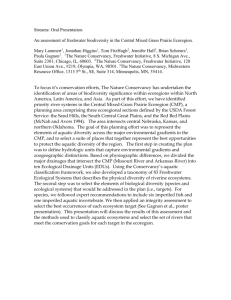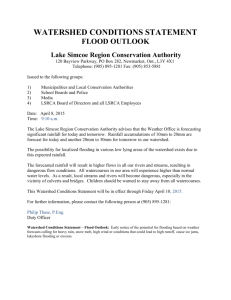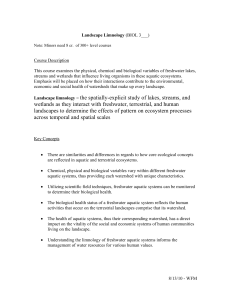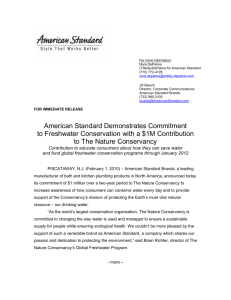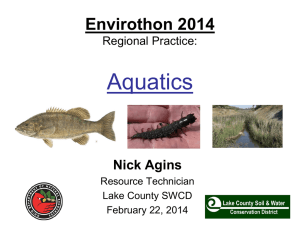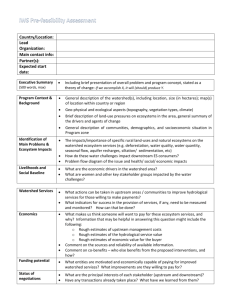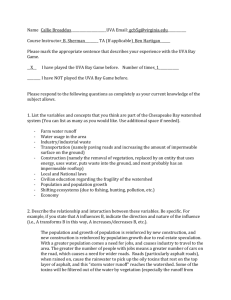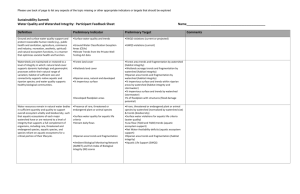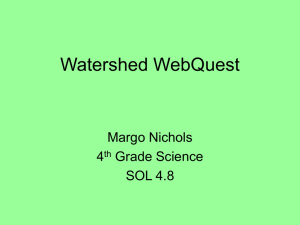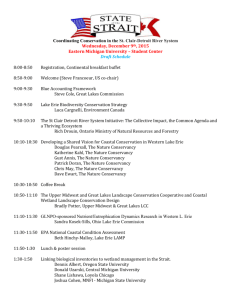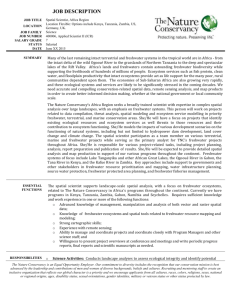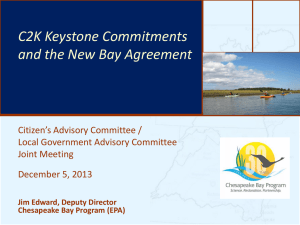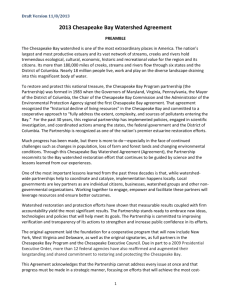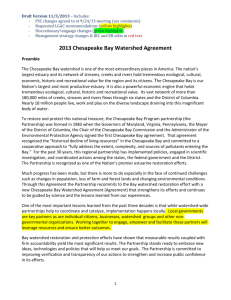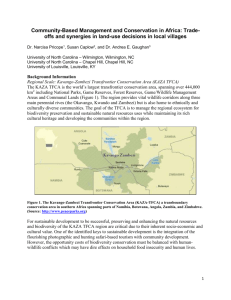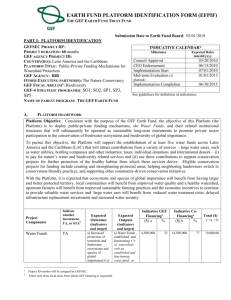Watershed Scientist_Ches Bay_400002_final_2_17_11
advertisement
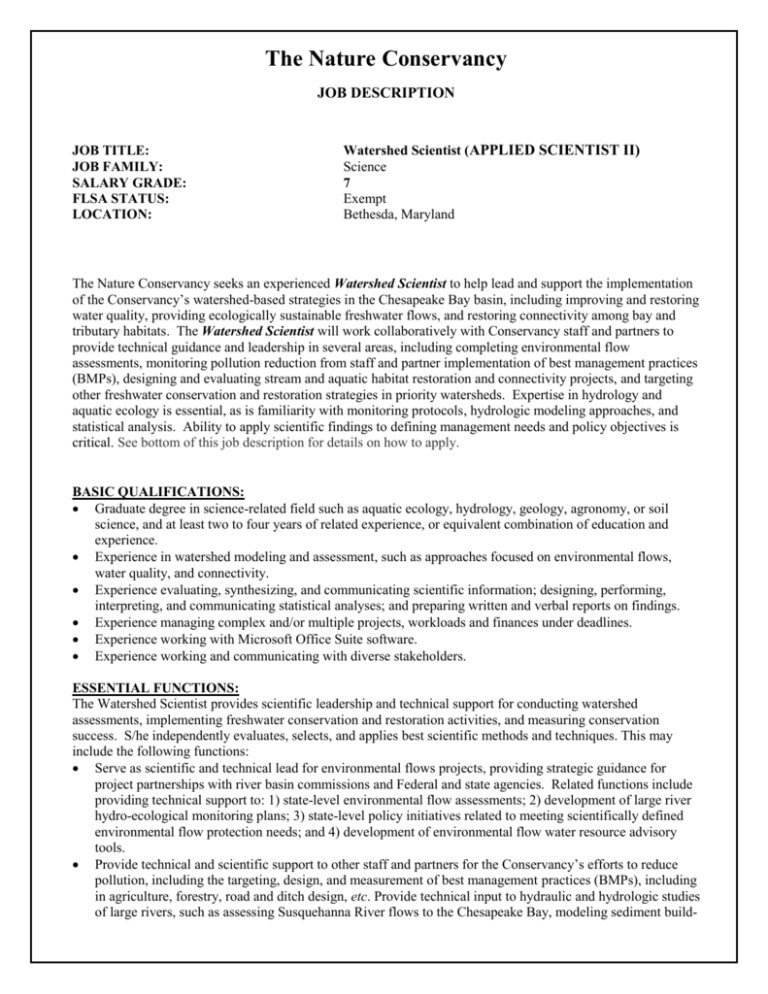
The Nature Conservancy JOB DESCRIPTION JOB TITLE: JOB FAMILY: SALARY GRADE: FLSA STATUS: LOCATION: Watershed Scientist (APPLIED SCIENTIST II) Science 7 Exempt Bethesda, Maryland The Nature Conservancy seeks an experienced Watershed Scientist to help lead and support the implementation of the Conservancy’s watershed-based strategies in the Chesapeake Bay basin, including improving and restoring water quality, providing ecologically sustainable freshwater flows, and restoring connectivity among bay and tributary habitats. The Watershed Scientist will work collaboratively with Conservancy staff and partners to provide technical guidance and leadership in several areas, including completing environmental flow assessments, monitoring pollution reduction from staff and partner implementation of best management practices (BMPs), designing and evaluating stream and aquatic habitat restoration and connectivity projects, and targeting other freshwater conservation and restoration strategies in priority watersheds. Expertise in hydrology and aquatic ecology is essential, as is familiarity with monitoring protocols, hydrologic modeling approaches, and statistical analysis. Ability to apply scientific findings to defining management needs and policy objectives is critical. See bottom of this job description for details on how to apply. BASIC QUALIFICATIONS: Graduate degree in science-related field such as aquatic ecology, hydrology, geology, agronomy, or soil science, and at least two to four years of related experience, or equivalent combination of education and experience. Experience in watershed modeling and assessment, such as approaches focused on environmental flows, water quality, and connectivity. Experience evaluating, synthesizing, and communicating scientific information; designing, performing, interpreting, and communicating statistical analyses; and preparing written and verbal reports on findings. Experience managing complex and/or multiple projects, workloads and finances under deadlines. Experience working with Microsoft Office Suite software. Experience working and communicating with diverse stakeholders. ESSENTIAL FUNCTIONS: The Watershed Scientist provides scientific leadership and technical support for conducting watershed assessments, implementing freshwater conservation and restoration activities, and measuring conservation success. S/he independently evaluates, selects, and applies best scientific methods and techniques. This may include the following functions: Serve as scientific and technical lead for environmental flows projects, providing strategic guidance for project partnerships with river basin commissions and Federal and state agencies. Related functions include providing technical support to: 1) state-level environmental flow assessments; 2) development of large river hydro-ecological monitoring plans; 3) state-level policy initiatives related to meeting scientifically defined environmental flow protection needs; and 4) development of environmental flow water resource advisory tools. Provide technical and scientific support to other staff and partners for the Conservancy’s efforts to reduce pollution, including the targeting, design, and measurement of best management practices (BMPs), including in agriculture, forestry, road and ditch design, etc. Provide technical input to hydraulic and hydrologic studies of large rivers, such as assessing Susquehanna River flows to the Chesapeake Bay, modeling sediment build- up behind Conowingo Dam, and hydrological and ecological studies related to hydropower dam reauthorizations. Contribute to and apply results of ongoing Chesapeake Bay stream connectivity analysis, help design related implementation projects, and contribute to funding proposals for priority connectivity restoration projects. Develop collaborative relationships and partnerships (e.g., with freshwater ecology and watershed science experts in Federal, state, and local governments, academic institutions, and non-government organizations throughout Maryland, Virginia, and the other Chesapeake Bay watershed jurisdictions) that support the development of innovative scientific methods, analyses, tools, and frameworks, and communicate solutions and best practices to multiple audiences. Plan and perform fieldwork, including ecosystem assessment and field monitoring, and provide support to other staff and partners for research, project development, monitoring, and measuring ecological outcomes. Develop conceptual models, help develop adaptive management plans, and identify and design ecosystem conservation strategies related to freshwater habitats and species, including identification of environmental flow needs, aquatic habitat restoration priorities, and threat reduction actions. REQUIRED KNOWLEDGE AND SKILLS: Graduate degree in science-related field and at least two to four years of related experience, or equivalent combination of education and experience. Knowledge of aquatic species, natural communities, ecosystems, and terrestrial and aquatic ecosystem processes and their conservation needs, ideally in the mid-Atlantic region. Familiarity with common watershed hydrologic, nutrient, and sediment models, and ability to select best model for a specific application given time and data constraints. Knowledge of current scientific trends and practices in relevant disciplines and region. Knowledge of threats to ecological integrity, and appropriate management and policy approaches to address them. Experience identifying and communicating policy or management alternatives related to scientific findings. Ability to collect, manipulate, analyze, and interpret scientific data, evaluate data quality, conduct complex statistical analyses, and prepare reports on findings. Ability to synthesize, interpret, and communicate scientific information to influence conservation practice. Experience working with spatial data and Geographic Information Systems (GIS). Experience and facility with common software applications (e.g.; Word, Excel, web browsers), and ability to use computer technology to enhance the quality of work. Ability to manage time and diverse activities under deadlines while delivering quality results Ability to manage complex and/or multiple projects, including directing staff and volunteers as needed, and to coordinate external partnerships, workloads and project finances. Ability to communicate clearly via written, spoken and graphical means in English. Peer-reviewed publication record. Prior field experience preferred. COMPLEXITY/PROBLEM SOLVING: Cultivates and develops creative ideas to improve conservation strategies and practices. Anticipates, analyzes, diagnoses and solves complex ecological and hydrologic problems. Compiles and organizes scientific data with attention to detail. Analyzes situations, evaluates alternatives and implements solutions. Interprets guidelines, evaluates information and modifies processes to adapt to changing circumstances. DISCRETION/LATITUDE/DECISION-MAKING: Makes independent decisions based on analysis, experience and judgment. Ability to act independently on assigned tasks. RESPONSIBILITY/OVERSIGHT – FINANCIAL AND SUPERVISORY: Designs and implements experiments relative to program area. May supervise a small staff of scientists, technicians, interns and/or volunteers on a project basis. May manage a grant or contract or write a request for proposal. May negotiate and contract with vendors. COMMUNICATIONS/INTERPERSONAL CONTACTS: Ability to work cooperatively with a number of staff and external public and/or private parties, sometimes under pressure and with diplomacy and political sensitivity, in order to complete project work and goals in a timely manner. Ability to influence and guide team of partners over which you have no direct authority. Provide a variety of information to staff and others, contributing to conservation projects and assisting workflow throughout the organization. Work and communicate effectively with a diverse group of people, including scientists, government agency partners, TNC staff and others, providing and obtaining needed information. Demonstrated experience writing grants and research proposals. Ability to simplify and explain complex scientific data to general audiences in written and verbal form. WORKING CONDITIONS/PHYSICAL EFFORT: The Applied Scientist II may work in variable weather conditions, at remote locations, on difficult and hazardous terrain and under physically demanding circumstances. These conditions may: require physical exertion and/or muscular strain present possibility of injury require long hours in isolated settings require occasional travel domestically and/or internationally require occasional evening and weekend hours HOW TO APPLY To apply for this position please visit www.nature.org/careers/, click How to Apply and then click View Positions. You may now search for position #12958 by the position title and location. All resumes must be submitted through The Nature Conservancy's online application. Please submit resume and cover letter as one document. The online application must be completed in its entirety, including work history, education and all required attachments, in order to be considered for a position. When using the online application, do not click the back, forward or refresh buttons to navigate, doing so will cause information to be lost. For more details on how to use the online application please see our User Guide at http://www.nature.org/careers/files/external_applicant_userguide.pdf. You must click submit to apply for the position. Click save if you want to be able to return to your application and submit it later. Once submitted, applications cannot be revised or edited. All applications must be submitted in the system prior to 11:59 p.m. Eastern Time on March 11, 2011. The Nature Conservancy is an Equal Opportunity Employer.
